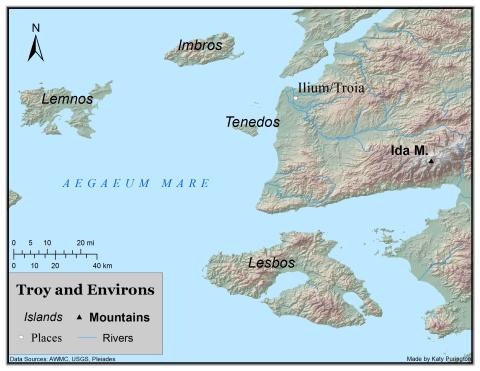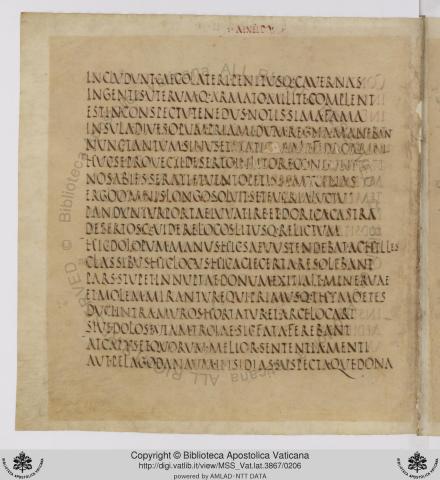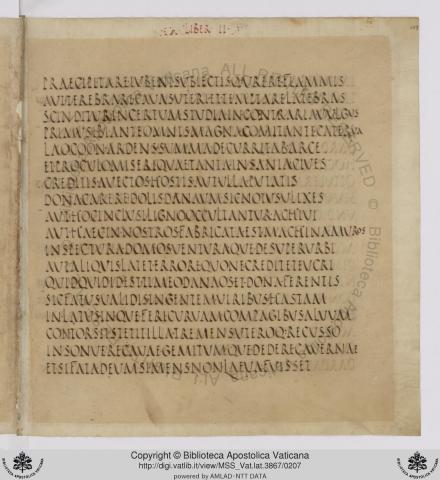Est in cōnspectū Tenedos, nōtissima fāmā
īnsula, dīves opum Priamī dum rēgna manēbant,
nunc tantum sinus et statiō male fīda carīnīs:
hūc sē prōvectī dēsertō in lītore condunt;
nōs abiisse ratī et ventō petiisse Mycēnās.25
Ergō omnis longō solvit sē Teucria lūctū;
panduntur portae, iuvat īre et Dōrica castra
dēsertōsque vidēre locōs lītusque relictum:
hīc Dolopum manus, hīc saevus tendēbat Achillēs;
classibus hīc locus, hīc aciē certāre solēbant.30
Pars stupet innūptae dōnum exitiāle Minervae
et mōlem mīrantur equī; prīmusque Thymoetēs
dūcī intrā mūrōs hortātur et arce locārī,
sīve dolō seu iam Trōiae sīc fāta ferēbant.
At Capys, et quōrum melior sententia mentī,35
aut pelagō Danaüm īnsidiās suspectaque dōna
praecipitāre iubent subiectīsque ūrere flammīs,
aut terebrāre cavās uterī et temptāre latēbrās.
Scinditur incertum studia in contrāria vulgus.
notes
Manuscripts: M 21-30, 31-39 | P 21-23, 24-39 | R 21-36, 37-39
21: est: “There is” (G-K) (AG 284b and 598c). in cōnspectū: i.e., Troiae; about four miles from the coast (Comstock). Map of Troy and environs. nōtissima: For its temple of Apollo Smintheus, but Vergil is doubtless thinking also of its later fame in the Persian and Peloponnesian wars (Storr). fāmā: AG 404 or 418.
22: dīves opum: gen. of respect, common after adjectives expressing fulness or emptiness: and in Vergil common after a great variety of adjectives, in imitation of the Greek (Sidgwick) (AG 349d).
23: tantum: neut. acc. as adv., “merely” (Comstock). statiō male fīda: i.e., unsafe. In poetry male often serves as a mere negative (Bennett). carīnīs: navibus by synecdoche (F-B).
24: hūc: may be joined with condunt, according to the usage mentioned in 18, or with prōvectī (Frieze). prōvectī: middle voice (Comstock). dēsertō: the change in the fortunes of the island was already begun. Its inhabitants, no doubt, were Trojans, who had removed to Troy when the siege began (Knapp). condunt: i.e., the Greeks (F-B).
25: abiisse: supply the subject eōs (Frieze). ratī: sc. sumus (F-B). ventō: AG 409. Mycēnās: Mycenae, a very ancient city near Argos, and the home of Agamemnon. Its remains, in a very archaic style of art, are among the most interesting in Greece (G-K). = in Graeciam: the royal city of Agamemnon, the leader of the Greeks, is put for the whole country (H-H).
26: The sound of the spondaic line is effective, as of the lifting of a heavy weight (Sidgwick). This is a very memorable line, simple in diction, slow, monotonous with dissyllables, with patterned alliteration of s and l—it is like a long deep sigh of relief (Williams). omnis longō Teucria lūctū: note the careful artistic order; cf. 1.4 (F-B). Teucria: “the Trojan land,” so called from Teucer, the old mythical king of the place (Sidgwick). lūctū: AG 400.
27: panduntur portae: a sign of peace (H-H). iuvat: sc. Troiānōs (F-B). īre: = exīre (Comstock). Dōrica: = Graeca. The Peloponnesians came of Doric Greek race, and so this is one of the numerous names for the Greek army, Achivi, Argolici, Argivi, Danai, Dorici, Pelasgi, Graii (Sidgwick).
28: locōs: “stations”; prose Latin would have used loca (C-R).
29–30: These lines express the thoughts in the minds of the Trojans as they visit the Greek camp (Williams).
29: tendēbat: sc. tentōria (Storr). “Encamped,” a technical use of the word (lit. “stretch” the tent); usually it has acc. after it, but here it is used intransitively (Sidgwick).
30: classibus: = navibus, an archaic use (F-B). The plural is used because each contingent of the Greek host brought its separate vessels (Bennett). locus: (erat), i.e., “here the ships were beached” (Comstock) (AG 376).
31: pars: “some” (Carruthers). stupet: as equivalent to a strong mirātur, here governs an acc. (G-K). The transitive use is a Virgilian invention, found elsewhere to any extent in Statius only (Austin). innūptae: Minerva was celebrated as “the virgin goddess” (Bennett). Minervae: an objective genitive; “the gift (offered) to Minerva” (Frieze). The Greeks had offended Minerva by carrying off her statue from Troy’s citadel. They now gave it out that the horse was meant as a substitute for this statue. This would seem to the Trojans a natural proceeding; hence the success of the Greek scheme to get the horse and its occupants into the city (Knapp). exitiāle: The adj. fits Aeneas’s feelings as he tells his story, not those with which the Trojans first saw the horse (Knapp).
32: mīrantur: Note the change in the number; the subject in the one case is regarded as a unit, in the other case the individuals are in the mind of the poet (H-H). Thymoetēs: is mentioned in Iliad 3.146 as one of the elders of Troy. According to Servius (Aen. 2.32) a soothsayer had predicted that a child should be born on a certain day, who should cause the destruction of Troy. On that day both Paris, the son of Priam, and Munippus, the son of Thymoetes, were born. Priam, supposing the prophecy had reference to Munippus, ordered both the infant and his mother, Cylla, to be put to death. Aeneas, therefore, is in doubt whether the advice of Thymoetes to carry the horse into the city is given out of resentment and treachery (dolō), or under the influence of fate (sic fāta ferēbant) (Frieze).
33: dūcī...locārī: as subject understand eum referring to equī. The infinitive with hortāri is poetical. The regular construction is a subjunctive clause introduced by ut or nē (Bennett) (AG 563). arce: the post of honor (Comstock). The preposition in phrases telling the place where (as also the place to or from which) is more often omitted in poetry than in prose (C-R).
34: iam: now at last after so many years (Howson). ferēbant: intr., “were tending,” “were leading.” So we have in prose mea fert opiniō, vestra voluntās fert, sī occāsiō tulerit (Sidgwick). ferō is often thus used without an object after words like ut, ita, sīc to indicate the “set” or “tendency” of events, wishes, etc. (Page).
35: quōrum...mentī: supply erat; equivalent to quibus melior sententia erat (Frieze). mentī: AG 373.
36–38: aut...aut: the correlatives contrast two opposite lines of policy: (1) to destroy the horse; (2) to explore its interior. Under the first head two different modes of procedure are suggested, connected by -que, where we should expect -ve (Bennett). There are two plans suggested as to the disposition to be made of the horse: one, to destroy it at once, the other to penetrate the fabric and ascertain what there is in it. These two main propositions are separated by aut. The first of them, however, contains two subordinate ideas as to the method of destroying the horse: some advise to cast it into the sea, and others, to burn it. Hence the propriety of -que, rather than -ve; a reading sometimes adopted here, but without good authority (Frieze).
36: pelagō: dative, with a verb of motion (F-B). For in pelagus (Frieze) (AG 363 and 428h). Dan(ōr)um īnsidiās: viz. the horse; further explained by suspecta dōna (Bennett). Such combinations of abstract and concrete are a favourite device of Vergil (Sidgwick).
37: subiectīsque...flammīs: i.e., by placing fires beneath (Bennett).
38: cavās: agrees with latēbras (G-K).
39: studia in contrāria: “into opposing parties” (F-B).
vocabulary
cōnspectus, ūs, m.: a seeing or viewing; view, sight, 1.34; presence, 6.108; mediō in cōnspectū, in the midst of the gazing assembly. (cōnspiciō)
Tenedos, ī, f.: an island in the Aegean about five miles from shore in sight of Troy, 2.21.
Priamus, ī, m.: 1. Priam, son of Laomedon, king of Troy, 1.458, et al. 2. A Trojan youth, son of Polites and grandson of King Priam, 5.564.
statiō, ōnis, f.: a standing; place of standing; station, post, 9.183; anchorage, 2.23; resting-place, haunt, 5.128. (stō)
fīdus, a, um: adj. (fīdō), trustworthy, faithful, trusty, 1.188; safe, secure, hospitable, 5.24; w. gen., tuī fīdissima, most faithful to thee, 12.659.
carīna, ae, f.: the keel of a ship, ship, 4.398; a boat, 6.391; frame, timber, 5.682.
prōvehō, vexī, vectus, 3, a.: to carry forward or forth; (pass.), provehor, vectus sum, to be borne, ride, sail forth or away, 3.72; proceed, continue, 3.481.
dēsertus, a, um: desolate; abandoned, 12.664; uninhabited, solitary, lonely, 3.646.
abeō, īvī, or iī, itus, īre, irreg. n.: to go away, depart, 2.675; go off, go aside, turn off, 5.162; pass into, sink into, 9.700; go forward, take the lead, 5.318; retreat, 2.382; change or be transformed.
Mycēnae, ārum, and Mycēna, ae, f.: Mycenae, an ancient city of Argolis; the abode of Danaus, Pelops, and Agamemnon, 1.284, et al.
Teucria, ae, f.: the Trojan land; Troy, 2.26. (Teucer)
lūctus, ūs, m.: a mourning; sorrow, grief, woe, lamentation, 2.298, and freq.; personif., 6.274. (lūgeō)
pandō, pandī, passus or pānsus, 3, a.: to spread out or open, 7.641; unfurl, 3.520; extend, expose, 6.740; break through, open, 2.234; unbind, dishevel, 1.480; (fig.), disclose, declare, explain, reveal, 3.179.
Dōricus, a, um: (adj.), Doric; Greek, 2.27.
Dolopes, um, m.: the Dolopians, a warlike tribe of Thessaly, followers of Pyrrhus at Troy, 2.7.
manus, ūs, f.: the hand, 1.487; freq.; (meton.), action, movement of the hand; work, art, handiwork, 3.486; prowess, heroic deed, action, 2.434; force, violence, 2.645; a collection of persons; a band, crew, troop; an army, 2.29; forces, 5.623; multitude, 6.660; pl., manūs, workmen, 11.329; dare manūs, to yield, 11.558; extrēma manus, the finishing hand or touch, 7.572.
Achillēs, is (eos or ī), m.: the son of Peleus, king of Thessaly, and Thetis, daughter of Nereus, 1.468, et al.
stupeō, uī, 2, n. and a.: to be amazed or dazed; to be bewildered, confounded, lost in wonder, 1.495; wonder at, 2.31.
innūptus, a, um: (adj.), not veiled; unmarried, virgin-, 2.31.
exitiālis, e: adj. (exitium), destructive, fatal, deadly, 2.31.
Minerva, ae, f.: an Italian goddess, understood to be the same as the Greek Athena; the goddess of wisdom, of the liberal and industrial arts, and of systematic or strategic warfare, 2.31, et al.; (meton.), wisdom, wit; household work, spinning, the loom, etc., 5.284, et al.
mōlēs, is, f.: a cumbrous mass; a heavy pile or fabric; mound, rampart, 9.35; dike, 2.497; a mass of buildings, vast buildings, 1.421; structure, 11.130; frame or figure, 2.32; bulk, 5.118; weight, 7.589; pile, mass, 1.61; gigantic frame, 5.431; warlike engine, siege tower, 5.439; array, pomp, train, 12.161; body of soldiers, phalanx, 12.575; heavy storm, tempest, 5.790; toil, work, labor, 1.33.
Thymoetēs, ae, m.: a Trojan, 2.32, et al.
intrā: (prep. w. acc., and adv.), on the inside; within, 2.33, et al.; for in, 7.168.
locō, āvī, ātus, 1, a.: to place, put, 1.213, et al.; lay, 1.428; found, 1.247. (locus)
sīve or seu: (conj.), or if, freq.; or, 5.69; elliptical, 11.327; sīve (seu) — sīve (seu), whether — or, 1.569, 570; either — or, 4.240, 241.
Trōia, ae, f.: 1. Troy, the capital of the Troad, 2.625, et al. 2. A city built by Helenus in Epirus, 3.349. 3. A part of the city of Acesta in Sicily, 5.756. 4. The name of an equestrian game of Roman boys, 5.602.
Capys, yos or yis, m.: 1. The commander of one of the ships of Aeneas, 1.183. 2. The eighth king of Alba, 6.768.
pelagus, ī, n.: the sea; open sea, main, 1.138; flood, 1.246.
Danaī, ōrum, m.: the Greeks, 2.327.
īnsidiae, ārum, f.: a sitting down, or lying in ambuscade; an ambush, 11.783; snare, toil; plot, treachery, wile, 2.36; stealthy journey or enterprise, 9.237; artifice, stratagem, 2.421; personif. pl., Īnsidiae, ārum, Stratagem, 12.336. (īnsideō)
suspectus, a, um: suspected, conjectured, guessed at; in suspicion, suspicious, mistrusted, 2.36; causing suspicion, fear, apprehension; distrusted, 3.550. (suspiciō)
praecipitō, āvī, ātus, 1, a. and n.: to cast headlong, hurl, plunge, 2.37; urge, hurry, hasten; impel, incite, 2.317; break off, end swiftly, 12.699; hasten away, 4.565; n. (sc. sē), fall headlong, 6.351; descend swiftly, 2.9; run down, 4.251. (praeceps)
iubeō, iussī (fut. perf. iussō for iusserō, 11.467), iussus, 2, a.: to order, request, usually w. inf., freq.; bid, 2.3; ask, invite, 1.708; will, wish, desire, 3.261; direct, enjoin, admonish, 3.697; persuade, advise, 2.37; to clear by command, 10.444; w. subj., 10.53.
subiciō, iēcī, iectus, 3, a.: to cast, throw, place or put under, 2.236; (fig.), to excite, kindle, 12.66; to subjoin, utter in reply, answer, 3.314; p., subiectus, a, um, cast under, put under, 6.223; situated under, bowed, bending, 2.721; put down, subdued, conquered, 6.853. (sub and iaciō)
ūrō, ussī, ūstus, 3, a.: to burn; burn up, 2.37; inflame with love, 4.68; trouble, disturb, torment, 1.662.
terebrō, āvī, ātus, 1, a.: to bore through; pierce, penetrate, 2.38; take out by boring, bore out, 3.635. (terebra, an instrument for boring)
cavus, a, um: (adj.), hollow, 1.81; concave, 8.599; arching, vaulted, 2.487; cavae manūs, the palms of the hands, 12.86.
uterus, ī, m.: the womb, belly, 11.813; cavity, 2.38.
latebra, ae, f.: a hiding place; recess, lodgment, retreat, 12.389; usually in pl., latebrae, ārum, an ambuscade; covert, retreat; cavern, 3.424; recess, cavity, 2.38; the hatches of a ship, the hold, 10.657. (lateō)
scindō, scidī, scissus, 3, a.: to cut asunder; split, 6.182; part, separate, divide, 1.161; tear, 9.478; (fig.), divide, 2.39.
incertus, a, um: (adj.), uncertain, 2.740; wavering; fickle, 2.39; doubtful, 3.7; undistinguished, base, 11.341.
contrārius, a, um: adj. (contrā), opposite; (fig.), contrary, opposed, opposing, 2.39; unfavorable, adverse, 1.239; subst., contrāria, ōrum, n. pl., opposite things, different counsels, 12.487.




